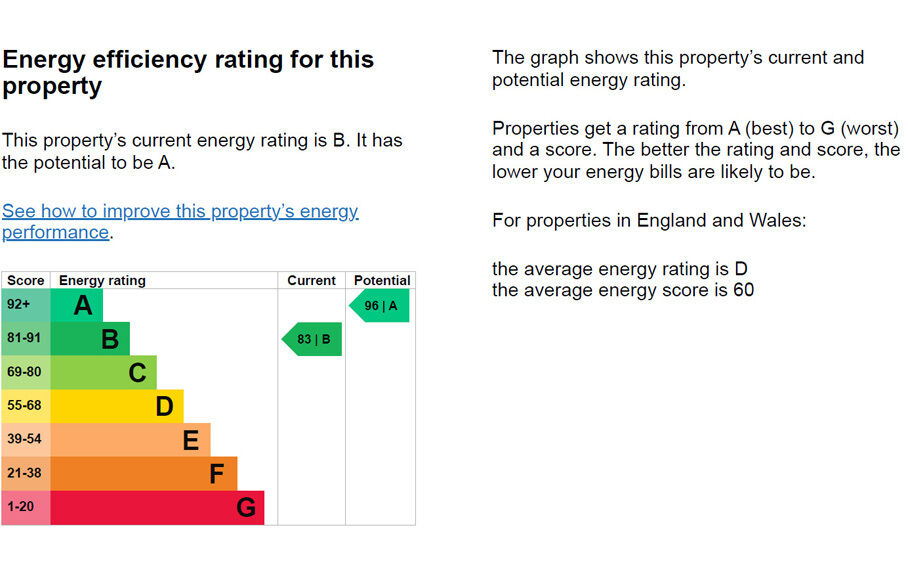
The government website states: “Government has committed to look at a long term trajectory to improve the energy performance standards of privately rented homes in England and Wales, with the aim for as many of them as possible to be upgraded to EPC Band C by 2030, where practical, cost-effective and affordable.”
As it stands currently, all private landlords must ensure their property has a minimum Energy Performance Certificate (EPC) rating of E before it’s let. And you’ll probably be aware that for the last couple of years, the government proposal has been for that to be raised to C in 2025 for new and renewed tenancies, and 2028 for existing tenancies.
This never actually became law, so landlords were left rather in the dark about when they might need to make energy efficiency improvements. And with the current cost-of-living crisis and high prices of materials and labour, many landlords were understandably not keen to spend money right now unless absolutely necessary.
Ultimately, in late September Prime Minister Rishi Sunak announced the scrapping of these targets during a press conference from Downing Street. He stated, "landlords will not be required to invest substantial sums of money during a cost-of-living crisis when many are themselves struggling financially."
EPC minimum standards: a timeline up to September 2023
- 1st April 2018: Minimum Energy Efficiency Standards (MEES) came into force in England and Wales, making it illegal to let or renew an assured tenancy on a domestic property rated F or G on the EPC without registering an exemption.
- April 2019: The government imposed a ‘spending cap’ of £3,500 for the cost of improvements. If it would cost landlords more than this (of their own money) to bring the property up to standard, then they should do as much as is possible for under £3,500, then register an exemption.
- July 2021: The Minimum Energy Performance of Buildings Bill was introduced in parliament, calling for all new tenancies to have a minimum EPC rating of C from 2025 and all existing tenancies to reach this by 2028, “where practical, cost-effective and affordable”.
- March 2023: The Bill was proposed for a second reading in parliament, which is scheduled to take place on 24th November.
- September 2023: The government announces it is scrapping the proposed changes to the Minimum Energy Efficiency Standards rules as part of the UK's recommittal to Net Zero by 2050.
Announcements made at the end of September
There had been reports back in March that the spending cap for landlords could be increased from £3,500 to £10,000, pointing out a big issue that has been concerning the industry. That’s the fact that landlords of cheaper properties will be hit harder financially, because the cost of improvements represents a bigger proportion of both the value of the property and their rental income.
For instance, a three-bedroom house in one area might be worth £180,000, while one in a neighbouring area could be worth double that. But the cost of upgrading the windows and doors to double glazing or fitting a new energy-efficient heating system is not half the cost for the cheaper property. And on top of that, the improvements won’t add as much value to the cheaper house as they will to the more expensive one.
After considerable economic and political pressure, the government eventually announced a U-turn in the latter half of September, stating that they were to
"scrap policies [that] force landlords to upgrade the energy efficiency of their properties, but instead continue to encourage households to do so where they can."
So, for the time being landlords are being given some leeway on the timescale for energy efficiency improvements to be made to their properties. However, the government made it clear that the UK is still committed to its net zero goals. One of the leading reasons to delay these goals was to reduce the financial burden put on the public. So while for the time being the EPC minimum Energy Performance Certificate of rating of E, it would be reasonable to anticipate that the Minimum Energy Efficiency Standards rules could still change in future.
If the spending cap were to be raised at some point, it might be fairer to do it proportionally, according to the value of the property. Otherwise, we expect that some landlords will find the cost of improvements unaffordable and may have to consider selling.
My property is rated D or E - what should I do now?
We’d suggest it’s worth investigating improvements sooner rather than later, while the £3,500 spending cap is still in place and before contractors get too busy. According to a government consultation published in 2020, around two-thirds of properties in the Private Rented Sector (just over 3 million) were rated D or below. Even allowing for exemptions and some of those have been upgraded over the last few years, that still leaves a huge number that will have to carry out works.
Your current EPC should show what kind of improvements would raise the rating and also give you a breakdown of costs and savings. Three areas to focus on are:
- Insulation - walls, loft and floor
- Double or triple-glazing - windows and doors
- Heating system – ensuring it’s energy efficient
And try to think of the money it costs to make the necessary improvements as an investment, rather than simply an outlay. Tenants are putting more and more importance on finding a home that’s cost effective to light and heat – especially with the current cost-of-living crisis - which could mean your property lets more quickly and at a better market rent.
Energy efficiency upgrades should also help protect and may improve the capital value of the property, which could be significant if you want or need to sell in the coming years.
You can find full information about the current MEES regulations on the government website. And if you’d like to discuss any aspect of making energy efficiency improvements to your property, just get in touch with your local Your Move branch and one of the team will be happy to help.
The current minimum EPC rating for rented properties is Scotland ‘E’. The government’s announcement does not apply to properties in Scotland as energy policy is devolved. Current proposals are to raise that to C from 2025 for a change in tenancy and from 2028 for all tenancies.
It is expected that the Scottish government will publish a consultation on a Heat in Buildings Bill at some point later this year. It is expected that this bill will set out the requirements for property owners to improve the energy efficiency of their properties.
In Northern Ireland, although every property must have an EPC, there’s currently no minimum rating to let. However, there are proposals are to introduce minimum standards in the near future via the Private Tenancies Bill.
Want to find out if you are achieving the best rental income?
The Your Move Content Marketing Team



